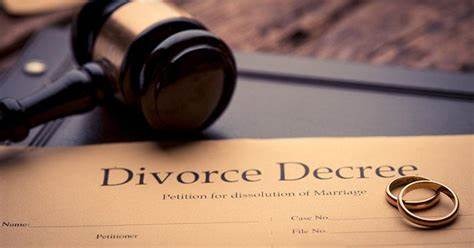CGT & Divorce / Separation
Changes to CGT legislation may mean a change in the result of the transfer of property due to divorce or separation.
TAX TIPS
Question: "We represent a client who is going through a messy divorce. The couple own their main home and a rental property jointly. They separated in January 2022 when my client moved out, and it has taken this long to get to a stage where they have agreed that my client will keep the rental property (which has long-term tenants), and his former wife will keep the main residence. The divorce is still being finalised, but they want to know the implications if these transfers happened in a court order dated before or after April 2023, as they are aware there are some new rules coming in."


With changes to CGT legislation coming into force from 6th April 2023, we take a look at commentary by Amaira Badat of Croner-i
We have discussed the upcoming changes with Amaira a number of times over the recent weeks. Today we look at Amaira's commentary on the subject.
We will begin by looking at the implications of a transfer before April 2023 under the current rules, and then what happens if the date of disposal is after April 2023, under the proposed new legislation.
HMRC’s guidance on the date of disposal under court orders as part of a divorce is available at: CG22400P – Capital Gains manual: individuals: transfer of assets between spouses or between civil partners: transfers of assets following permanent separation, divorce or dissolution: Contents
As your client separated in January 2022, the tax year of separation will be the 21/22 tax year. I understand your client left the marital home at this point and currently lives in different short-term rented accommodation.
Under the current legislation, any disposals made between spouses in the tax year of separation is treated as a no-gain, no loss transfer under s58 TCGA 1992. Any transfers made after the tax year of separation but before the divorce is finalised is treated as a disposal between connected parties, and therefore proceeds are deemed to be at market value. Any transfer after the decree absolute will also most likely be subject to the market value of s17 TCGA 1992 unless, rarely, it is on arm’s length terms.
The transfer of the main home to the former wife will be a market value disposal. Your client could claim PPR for the period of occupation plus the last 9 months. However, he could also make a claim under s225B TCGA 1992 to have the main home treated as his PPR until the point of disposal. This treatment is not automatic and requires the conditions in s225B to be met and a claim made by your client.
There is HMRC guidance on this claim at: CG65356 – Private residence relief: separation, divorce or dissolution of civil partnership: spouse or civil partner transferring interest
The transfer of the half -share of the rental property by the former wife to your client will also be a market value disposal. If there is a CGT liability, she will need to report and pay the tax to HMRC within 60 days of completion.
The main changes proposed to come in apply to disposals after April 2023. At this stage we have draft legislation only, with the clauses likely to be included in the Finance Bill 2023, that will be published in Spring 2023. The policy paper and draft legislation is available at: https://www.gov.uk/government/publications/capital-gains-tax-transfers-of-assets-between-spouses-and-civil-partners-in-the-process-of-separating
After April 2023, both the transfers would be deemed to be a no-gain, no loss disposals for 3 years after the separation. This would mean there would be no immediate tax implications for either party.
Your client’s former wife will be in a much better position if the disposal is made after April 2023 as she will have no immediate tax bill. Even though she will not get the uplift to market value on the 50% transferred from your client, she will still be covered by PPR for any future disposal.
However, your client will be at a disadvantage as he will not get the market value uplift in his base cost for the 50% of the rental property transferred to him. This means he will be subject to CGT on any future disposal of the property based on the original cost. His immediate CGT liability is unaffected whether the disposal is made before or after April 2023 as he has either a potential PPR claim under s225B or the no gain/no loss treatment..
Dependent on their feelings towards each other, and the general divorce proceedings, this difference in future tax bills could be considered as part of their overall negotiations.
The proposed changes include:
separating spouses or civil partners be given up to three years after the year they cease to live together in which to make no gain or no loss transfers
no gain or no loss treatment will also apply to assets that separating spouses or civil partners transfer between themselves as part of a formal divorce agreement
a spouse or civil partner who retains an interest in the former matrimonial home be given an option to claim Private Residence Relief (PRR) when it is sold
individuals who have transferred their interest in the former matrimonial home to their ex-spouse or civil partner and are entitled to receive a percentage of the proceeds when that home is eventually sold, be able to apply the same tax treatment to those proceeds when received that applied when they transferred their original interest in the home to their ex-spouse or civil partner
If you require assistance with the your tax affairs, please feel free to contact us on info@thetaxfaculty.co.uk or call us free on 0800 0016 878 for a free initial consultation.


Contact Us
Contact us today on freephone 0800 0016 878 for a free consultation on all tax issues, or fill out the handy form below and we'll get back to you as soon as possible.
Alternatively, you can email us at info@thetaxfaculty.co.uk or complete the form below.
(Please note, non-UK callers may need to call 0207 101 3845 if your line cannot connect to our 0800 number)
Feel free to contact us through WhatsApp - we accept calls and messages.
Simply click the WhatsApp button below:


